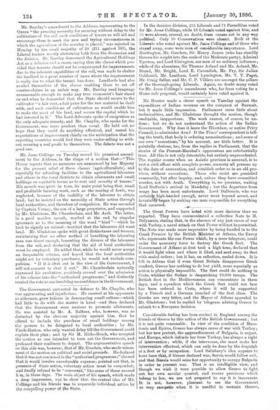Mr. Barclay's amendment to the Address, representing to the Queen
"the pressing necessity for securing without delay to the cultivators of the soil such conditions of tenure as will aid and encourage them to meet the new and trying circumstances in which the agriculture of the country is placed," was rejected on Monday by the small majority of 28 (211 against 183), the Liberal leaders mostly abstaining both from the discussion and the division. Mr. Barclay denounced the Agricultural Holdings Act as a delusion and a snare, saying that the clause which pro- vided that tenants should not be compensated for improvements due to the inherent capabilities of the soil, was made to shelter the landlord in a great number of cases where the improvement is really due to what the tenant has done. Landlords had also availed themselves of the clause enabling them to set off counter-claims in an unfair way. Mr. Barclay used language unreasonable enough to make any true economist's hair stand on end when he demanded that the State should secure to the cultivator "a fair rent, a fair price for the raw material he dealt with, and such conditions of cultivation as would enable him to make the most of his land, and secure the capital which he had invested in it." The Lord-Advocate spoke of emigration as the only adequate remedy, and Mr. Chaplin, who spoke for the Government, was more prudent than usual. He held out no hope that they could do anything effectual, and rested his expectations of improvement chiefly on the anticipation that the exporting countries would find they were under-selling us with- out securing a real profit to themselves. The debate was not a good one.


































 Previous page
Previous page